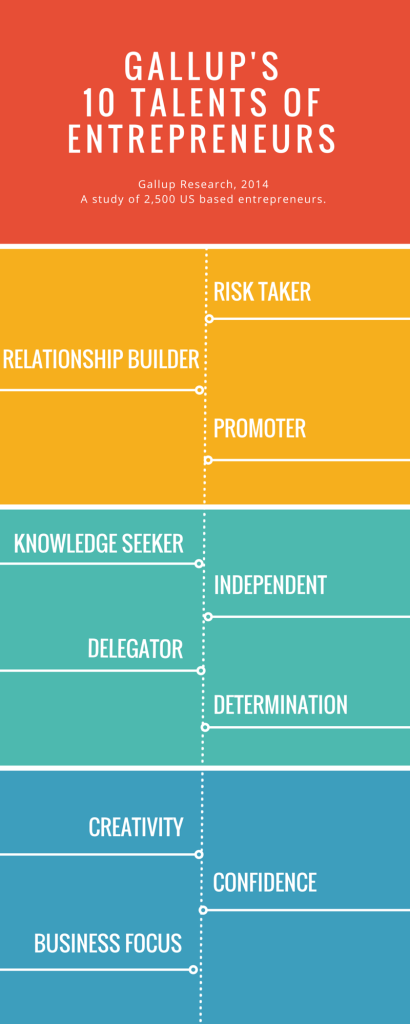
As an entrepreneur, you will need to master a number of skills to achieve success.
From the ability to notice new business opportunities; to being happy when taking risks; from being a natural promoter to being particularly adept at cultivating networks than others.
In fact, the range of skills that successful entrepreneurs demonstrate has led to some debate about whether or not entrepreneurs are born or made.
Research carried out by Scott Shane of Case Western Research University in Ohio, for example, shows that the genetic tendency towards entrepreneurship is between 30 – 40% innate, which seems to prove that entrepreneurs are born.
Or does it?
Well, yes and no.
Having the ‘gene’ doesn’t mean that you will become an entrepreneur – much less a successful one. And at the same time, NOT having it doesn’t mean that you definitely won’t become an entrepreneur.
Confused?
Well, whether genetics is on your side or not, the reality is that all entrepreneurs have to make the choice to start their own businesses in the first place and receive a decent Startup CEO Pay. They all need to put in the hard work and struggle to be successful.
So, even if you weren’t born with all of the skills I’m about to list, the good news is, that doesn’t mean that you are destined to fail.
So what are the skills that you need – and how can you master them?
In 2014, research by Gallup identified the top 10 skills that successful entrepreneurs must have, based on a study of 2,500 US entrepreneurs.

These are the starting point in terms of the skills that every successful entrepreneur has. However, there are still a few more to add to the list.
Don’t despair if you reckon you are missing a few of these. There are ways to gain the skills you need, while improving on the ones you already have.
To start with, it’s easiest to list all 21 skills under 4 main skill ‘types’ or categories:

PERSONAL SKILLS
Optimism
Is your glass half full or half empty?
Unsurprisingly, your view of the world – and how optimistic you are about achieving success, will affect your ability to succeed as an entrepreneur.
While there’s nothing wrong with a healthy does of realism, being pessimistic is unlikely to enhance your ability to make bold decisions for your business.
Mastery: Even if you’re not naturally optimistic, it is possible to develop an optimism ‘habit’.
- Checking yourself if you’re thinking negatively and try to take a more positive view
- Surround yourself with positive people
- Talk to yourself positively – be kinder about yourself and believe in your own actions.
Confidence
If you are confident about your decisions and the ability of others around you, then you are more likely to succeed.
Mastery: Improving your positivity will already have improved your confidence, but other tips include:
- Being assertive when dealing with people and your business
- Changing the way you think about yourself
- Changing your body language – stop stooping, make eye contact, smile more
- And when all else fails – have a list of achievements to hand. Write down everything that you’ve achieved that shows how awesome you are and refer back to it in moments of self-doubt.

Vision
Do you have a clear vision of what you want your business to achieve? Does that drive you forward each day?
Successful entrepreneurs have a strong vision for the future and a determination to improve the world through their product or innovation.
Larry Page wanted to create a better way for webpages to connect. In fact, he was so passionate about it that he and his business partner, Sergey Brin, dropped out of university and created Google. The rest is history…
Mastery: Ask yourself this. What is your why? Don’t think ‘what will my business be’ think ‘why’ and start to build your own vision of your business.
Need some inspiration? Check out Simon Sinek’s famous ‘What is your why?’ TED Talk.
Leadership
Are you a leader of a follower? Business needs both – but great entrepreneurs must have a strong desire to be in control and feel comfortable making decisions that could have a huge impact on their business.
Mastery: Continuing to educate and improve yourself is a key leadership skill. Recognizing your strengths and weaknesses defines good leadership and, by improving on what you already have, you can improve your ability to lead others.
Drive & determination
There will be days when no-one wants to buy what you’re selling, systems don’t work and no-one cares about what you’re doing.
If you don’t have the drive and determination to succeed, these are the days when you are more likely to want to crawl under the duvet than go to that important meeting or make that crucial call.
Mastery: You can improve your determination in a number of ways:
- Don’t over think, just act
- Strengthen your will by exercising it more often – it will make you braver in the long run
- Think about your end goal – what do you really want?
- Never give up

Successful entrepreneurs aren’t known for having many duvet days…
Risk-taker
You have to be comfortable taking risks. Entrepreneurs have to make decisions without having many – or any – of the facts. The path of any new business is uncertain – indeed, for many established businesses, it’s uncertain – and so the successful entrepreneur needs to be willing to take risks.
Mastery: It’s true to say that you have to be relatively comfortable with risks in the first place. But take some inspiration from others when you’re in need of a brave pill. Look at Evan Spiegel, co-founder of Snapchat, for example.
Having developed Snapchat with Bobby Murphy, Spiegel left Stanford University just three classes before completing his degree.
Then, in 2013, he infamously turned down a $3 billion purchase by Facebook, only to end the same year with both he and Murphy set to become billionaires.
Some might have thought both of those decisions were crazy at the time – they were certainly risky.
Resilience
Along with the determination to succeed and take risks, comes the ability to deal with failure because:
You are likely to fail.
Sorry, but there it is. 90% of startups fail.
The trick is not letting that be the whole story.
Thomas Edison, the famous inventor of the light bulb, made millions of dollars in his lifetime. But did you know that he’d failed countless times with numerous other inventions before finally having that (literal) light bulb moment?
Mastery: If you want to avoid becoming one of the 90%, take a look at the newly launched Autopsy website, which gives details on businesses that have failed – and why – so you can take steps to avoid the same mistakes.
INTERPERSONAL SKILLS
So we’ve dealt with the skills that you have within you. What about when you’re dealing with others, such as your customers, clients, investors and staff?
Team Building
We’ve already touched on leadership skills, but do you have what it takes to motivate the people around you – or to build a tribe of loyal customers? Can you build an effective team of people that will deliver your business needs?
Mastery: You’re probably reading this and thinking ‘I’m just at the start of my entrepreneurial journey. How do I know if I have this skill?’
Perhaps you’ve already built teams within your current workplace (if you’re in a job) or maybe you’ve always had the ability to spot the best people that will help you to deliver successful projects, or run fabulous events in college or school? Think about all the teams that you’ve worked with – or brought together.
Communication
In the early days – when you’re doing everything – good communication skills will mean that you can pick up the phone and speak to potential clients or investors; that you can write sales copy or a blog post that grabs attention; and that you’re able to sell your vision when no-one knows who you are or what you’re doing.
Of course, good communication isn’t all talking. It’s about listening – in fact, most of it is about listening. It’s also about using emotional intelligence to pick up clues from other people about whether what you are communicating is clear and interesting to them.
Mastery: If you’re not sure whether you’re a natural communicator, a good way to find out is simply to ask for feedback. Did that make sense? Do you understand what I’m trying to achieve? Ask questions and given people the chance to ask for more clarity and you will soon get a sense of how strong your communication is and will start to recognize the messages that you need to improve upon.

multirracial handshake from an african and a caucasian mens hand (isolated on white)
Negotiation
Whether you’re a solopreneur working from home or a new tech start-up, you will need to be able to negotiate.
You might need to raise finance or reduce costs. If you have staff, you may find yourself negotiating employment packages. And of course, you are likely to have negotiations on price with customers.
Mastery: Preparation is the key to successful negotiation.
Before making the call or going into the meeting:
- Consider your best alternative – in other words, your absolute minimum – and stick to it
- Be confident about your offer – don’t give too much away
- Open at your max – you might be pleasantly surprised
- Use silence – state your terms and then stop talking. It shows you’re confident about your offer
- Offer better terms – can you sweeten your offer with something of value but without reducing your best alternative?
Integrity
You are working to build a successful business and a core aspect of this is about dealing with clients, staff and investors with integrity. This will strengthen your brand and build customer and staff loyalty.
Anita Roddick of the Body Shop built an entire brand around integrity and ethics – but your business model doesn’t have to be ‘green’ to be ethical and fair.
Mastery: Try to see other viewpoints. Put yourself in the other person’s shoes. Most people only view the world from their own perspective, so by changing your view, you’re already ahead of the game.
CRITICAL SKILLS
Again, these are the type of skills that tend to be more innate than learned – but there are still ways to build your strengths in each of them.

Creativity
Successful entrepreneurs look at existing solutions and improve them. Or they take problems and come up with a new solution.
They are able to do this by using their creativity to take a different look at the world.
Mastery: You can improve your creativity by exercising your creative muscle more often.
- Be creative every day – whether it’s writing a blog post or thinking up a new marketing campaign
- Always carry a notebook around with you – you never know when inspiration will strike
- Open yourself up to new ways of thinking. If you work in tech, network with marketing directors in other industries; volunteer at a local charity; meet with entrepreneurs running social enterprises – go and meet people working in different industries from your own and see what lessons you can learn from each other
Problem Solving
The chances of your business running smoothly are slim.
You will have to deal with problems. Your website might crash when that blog post goes viral and your hosting package can’t cope. You might have issues with your production line. You might have to deal with unhappy customers.
Chances are that you’re reading this and thinking ‘But I don’t have any problem solving skills!’ That’s because it tends not to be a skill that many of us think that we have. Despite the fact that we are constantly solving problems every day. From broken washing machines to juggling childcare with work.
Howard Schultz, CEO of Starbucks, dealt with the problem of the recession – and the squeeze it was having on profits – by taking some tough decisions, including closing stores and slowing growth.
Now that the economy is recovering, Starbucks has diversified into retail sales, providing bottled and packaged goods into supermarkets. You’ve maybe seen their cold frappuccinos and their ground coffee on the shelves? Schultz dealt with the problem of falling profits by making cuts and diversifying to protect against future market changes too.
Mastery: One way to instantly become better at solving problems is to focus on the solution and not the problem itself.
What is it that you are trying to achieve and what are the different ways of achieving it based on what you have available? Just shifting the focus to the solution helps to create a more positive mindset, which in turn, helps us to deal more effectively with problems in the first place.
Recognizing Opportunities
Successful entrepreneurs constantly recognize opportunities. Whether it’s a new product to bring to market or a different way of dealing with a problem.
Mastery: There are a few aspects to consider that can help you to develop a ‘nose’ for the best opportunities:
- Ask whether the product or service will meet an existing need
- Do you have the resources – or access to the resources – that you need to get this to market?
- Can you provide the product/service at a price that the market will bear?
- Is the timing right – personally, for your business, and for the market?
Selling
Don’t worry, this doesn’t mean you have to be all ‘icky’ and ‘salesy’. Believing in your product – and having a brand that you are proud to promote – will help you to sell it to customers, staff and investors, naturally.
Mastery: Entrepreneurs tend to develop products and services that they believe in – but if you’re still not a natural sales person, make sure that you choose the sales channel that you are most comfortable with. You might like to pick up the phone, or you may prefer email or face-to-face meetings. Work to your strengths, and you will be more successful at selling.
PRACTICAL SKILLS
We’re into the final category of skills – and the good news is that ALL of these can be learned.
Strategy & goal setting
The truly successful entrepreneur doesn’t just have a product that they believe in and a vision of how it will enhance the world. They have a plan of how to achieve that vision – and goals for getting their product or service to market.
You know the well-worn phrase that ‘failing to plan is planning to fail?’ It’s well-worn and overused for a reason.
We might all be tempted to think of the Richard Branson’s of this world as being creative, fly by the seat of their pants types – but I’m willing to bet that Mr B has strategies and goals for all of his businesses too.
If you’ll be looking for investment, you will NEED a proper strategic plan, but even if you intend to work as a solopreneur from your bedroom, setting your goals out will make that bedroom empire more achievable.
Mastery: Start by simply writing down the What, Why and How aspects of your business. It’s a great first step to the beginnings of a strategy plan.
Delegation
Yes, there are 21 skills that every successful entrepreneur needs, and the good news is that delegation is one of them.
Recognizing your strengths and weaknesses means that you will also know when you need to focus on what you’re really good at, and when to leave the other aspects to someone else.
In the early days, you may not have this luxury, but when the business is up and running, delegation quickly becomes a necessity.
Mastery: If you can’t stand writing sales copy, employ a good freelance writer as soon as you can. If your diary, emails and calls are in backlog hell, hire a good VA. Recognize what you need to do versus what you ARE doing. Working ON the business rather than IN the business must be your focus if you’re aiming to build a successful enterprise.
Elance, ODesk and Freelancer are all good places to start to look for people to carry out those small jobs that need doing, but that you just don’t have time for when growing your business.

Decision-making
This is a practical skill that you will need to have when you are deciding whether to grab an opportunity or to diversify.
It’s true that some people are born with this skill but it can be one you can master. The more decisions that you make for your business – from choosing a logo to hiring staff – the easier it becomes.
Mastery: As your business experience grows, so too will your instinct for what will work and what won’t. However, bearing in mind that you will be making decisions from the start, there are a couple of tips to help you deal with them more easily.
- Make small decisions quickly. Clear them and move on.
- Ask for advice. If you’re really struggling with a decision, reach out to people who have been there before – through online forums, family and friends, or others in your field.

Financial
Not every entrepreneur needs to be a fully qualified accountant, but you do need to be able to interpret your accounts if you want to be able to make informed decisions about your business.
Mastery: Accounts may as well be written in hieroglyphics? Buy a book or take a course in basic finances – or even sit down with your trusted accountant (although they may charge you for their time). Whatever works for you – but make sure you have a basic grasp of figures and what they mean.
Marketing
You need to have a clear idea of who your customers are, what types of messages they respond to and how you will reach them.
Mastery: Do some market research. Figure out who your ideal customer is and figure out how to reach them. If you already have customers – just ask them! You can get a basic Survey Monkey account for free.
Modelling
You’ve created your business – or at least have an idea that you are developing. You should also have an understanding of the type of business model that works best in your industry.
Will you be online, offline or both? Do you need an office where you can meet customers or can you work from home? Understanding the best model for your business will put you on the path to success.
Mastery: Do some industry analysis. What do your competitors do – and can you capitalize on their weaknesses? What do customers in your field expect – and can you offer it better or differently?
Conclusion
So that’s it – 21 skills that every successful entrepreneur needs. The more that you are willing to continue to learn throughout your entrepreneurial journey, the more likely you are to succeed in the long run.
How many of the 21 do you already have and where do you think you need some help?














